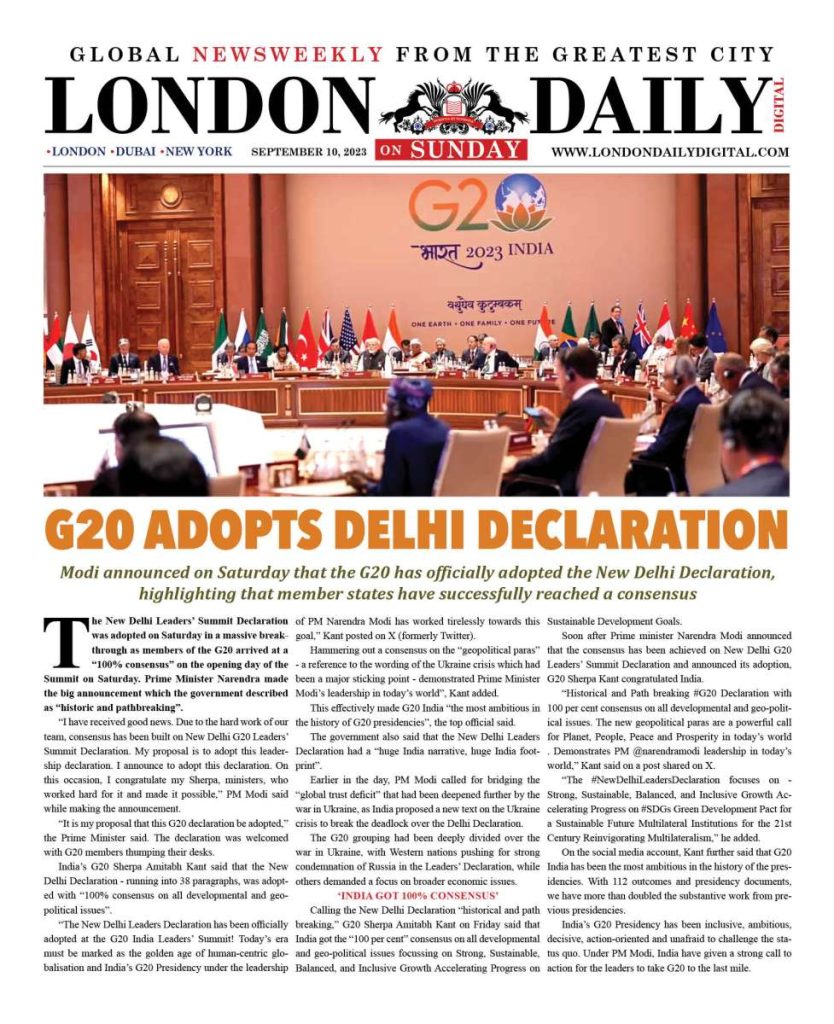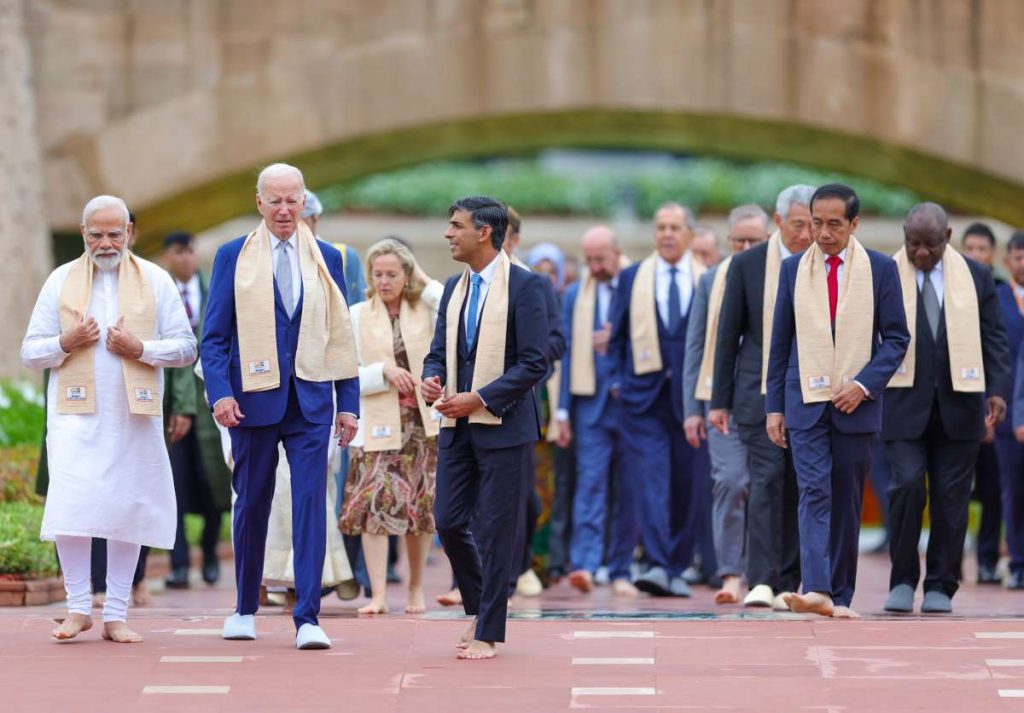
India’s G20 presidency can certainly be summed up in the motto and idea of ‘Sabka Saath, Sabka Vikas, Sabka Vishwas, Sabka Prayaas’ i.e., everyone’s support, everyone’s development, everyone’s trust and everyone’s effort. Serving as a guiding principle to the global problem and the trust deficit post-COVID, reliance on the same would surely help the world become a better place as well
On the concluding day of the G20 Leaders’ Summit in New Delhi, Prime Minister Narendra Modi passed on the gavel to Brazilian President Luiz Inacio Lula da Silva, and reiterated his full support to Brazil, expressing confidence that its presidency would take the shared goals of the G20 bloc to its logical conclusion. It is pertinent to apprise here that Brazil will formally assume the G20 Presidency on December 1, 2023. Additionally, in order to take stock of initiatives taken during India’s presidency, a proposed virtual G20 Summit would take place in the month of November.
Welcoming world leaders gathered at the G20 Summit which happened for the first time under India’s Presidency, the Prime Minister of India expressed heartfelt condolences to the people affected by the Morocco earthquake before the formal start on the inaugural day noting that ‘the entire world community is with Morocco in this difficult time, and we are ready to provide them all possible assistance’ as well in the true spirit of ‘Vasudhaiv Kutumbakam’. Much water has flown down the Ganges since G20 came into existence in 1999. Emphasising the seismic shift that the world has undergone in the 21st century, the world is in need of a new direction and the imperative significance of adopting a human-centric approach to seek new answers to centuries-old problems. India’s G20 presidency can certainly be summed up in the motto and idea of ‘Sabka Saath, Sabka Vikas, Sabka Vishwas, Sabka Prayaas’ i.e., everyone’s support, everyone’s development, everyone’s trust and everyone’s effort. Serving as a guiding principle to the global problem and the trust deficit post-COVID, reliance on the same would surely help the world become a better place as well.

Moving ahead fulfilling responsibilities with a human-centric approach, India emphasised upon the need and possibility of triumphing over the trust deficit caused by the war, urging the global leadership to look afresh at old problems and evolve new solutions. As the president of G20, Prime Minister Modi called upon the world together to transform the global trust deficit into one of trust and reliance. Be it the divide between North and South, the distance between East and West, management of food and fuel, terrorism, cyber security, health, energy or water security, the world must strive to find a solution together on all these issues of concern for future generations.
With much of the world focused towards the Russian-Ukraine conflict, India stayed focussed on addressing the needs of the developing world at the summit. As part of the same, India announced the historic initiative of including the 55 nations-strong African Union (AU) to the G20 permanent membership and invited the President of the Union of Comoros and Chairperson of the African Union (AU) Azali Assoumani to take a seat as a permanent member at the New Delhi G20 Summit. As an important symbol of inclusion on a global level, the summit with over 200 meetings taking place in 60 cities of the nation, India was able to connect on a people-to-people level both within the country as well as outside the country. True to their words, Indian leadership has been able to prove that it became a people’s G20 this time around.
On the first day of G20 Summit, Prime Minister Narendra Modi also announced the launch of Global Biofuel Alliance and invited other world leaders to join the initiative. Being the world’s third biggest oil consumer, the Global Biofuels Alliance was a major priority for India as it would help accelerate sustainable biofuels deployment in support of the global energy transition and make clean and solar energy affordable to one and all. Already, India has been able to reach the biofuel target it had set for itself for the year 2030 7 years prior i.e., in 2023 itself. Now, India has embarked on an even more ambitious target towards the same.
During the 3-day G20 Summit, Prime Minister Modi held various bilateral discussions with various world leaders to make this a better planet. On the concluding day, Prime Minister Modi led US President Joe Biden, UK PM Rishi Sunak, Australian PM Anthony Albanese, Canadian PM Justin Trudeau, Russian Foreign Minister Sergey Lavrov and several other heads of state, government and various international organisations to Mahatma Gandhi’s memorial Rajghat and observed a minute of silence besides laying wreath to pay homage to the Mahatma.
Most importantly, Prime Minister Modi announced on penultimate day that the G20 countries had forged an important consensus on the New Delhi G20 Declaration. It was a significant development considering the Delhi declaration seemed impossible as the Russia-Ukraine war and its concerns loomed large on it. Nevertheless, the G20 leaders resolved to establish international economic cooperation in concrete ways through partnerships and committed to work for a strong, sustainable, balanced and inclusive growth for effective implementation of the 2030 Agenda for Sustainable Development, ensuring better access to medical facilities, improved supplies and production capacities in developing countries for a better future, effectively addressing debt vulnerabilities in developing countries.
Besides granting permanent membership to AU, there were several major concerns critical to developing nations, like alternative fuels like hydrogen, resource efficiency, developing a common framework for digital public infrastructure and food security; democratising development banks like World Bank and International Monetary Fund, making them more accessible to lower and middle-income developing countries as they seek solutions to combat climate change, among other things, which found a mention and were deliberated upon during the three different sessions one One Earth, One Family & One Future. India’s lead negotiator and G20 Sherpa, Amitabh Kant while addressing the global media emphasised the need to boost climate financing, particularly for developing and emerging markets, adding that India’s view on the same was unambiguous and that the Global South, developing countries, emerging markets must be able to get long-term financing in order to secure a better & healthier world.

Buoyed at India’s grand success at the G20, PM Narendra Modi renewed its pitch for India’s admission to the veto-wielding United Nations Security Council (UNSC). Pointing to the four-fold jump in UN membership since it was set up 80 years ago, it seems quite eerie that the number of permanent members in the UNSC remains the same. Since then, the world has metamorphosed in every aspect. Be it transport, communication, health and education, every sector has been transformed completely. These new realities should reflect in the upcoming new global structure as well, and the restructuring of the UNSC would be an appropriate way to do so.
In summation, the G20 Leaders’ Summit in New Delhi, presided over by Prime Minister Narendra Modi, placed paramount importance on adopting a human-centric approach to confront the myriad challenges confronting our world today. India’s presidency exhibited a steadfast commitment to inclusivity, exemplified by the historic inclusion of the African Union in the G20’s permanent membership. Notably, India unveiled significant initiatives such as the Global Biofuel Alliance, underscoring its dedication to the cause of sustainable energy. Despite the looming spectre of the Russia-Ukraine conflict, world leaders managed to forge a consensus on the New Delhi G20 Declaration, underscoring their unwavering commitment to international cooperation and the pursuit of sustainable development. Overall, the Summit has been a major boost in the aspirations and objectives of the country. India is firmly in the saddle to lead the world towards a healthier, greener & more peaceful time.


